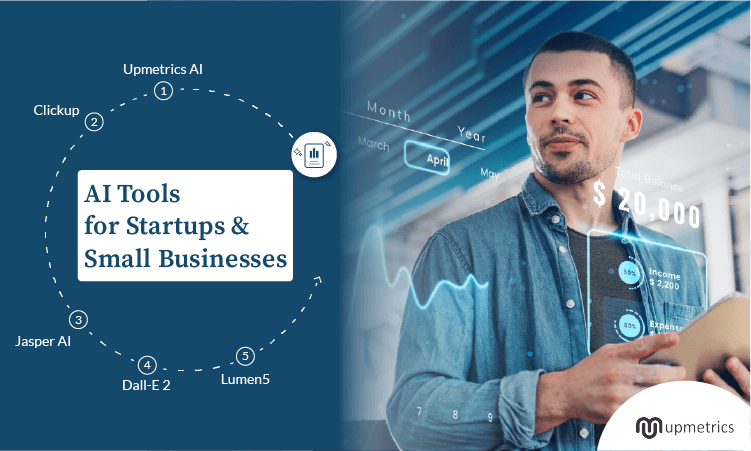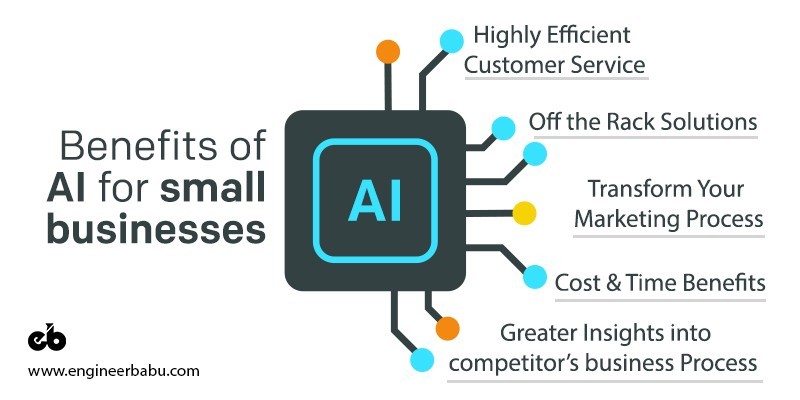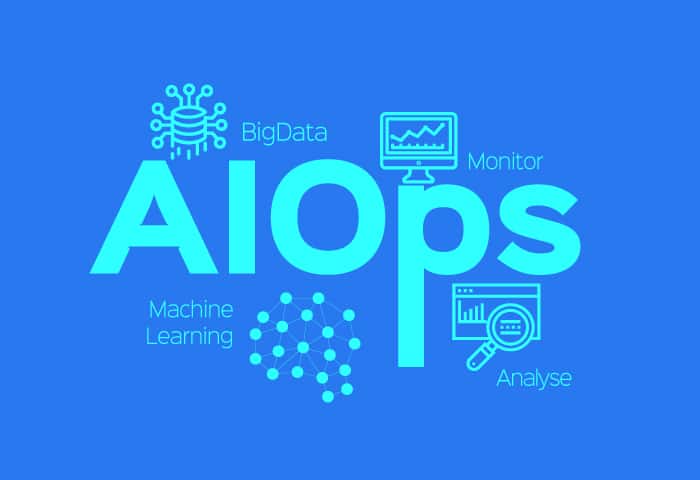Artificial Intelligence (AI) has revolutionized the business world in recent years and is transforming the way businesses operate. Small businesses, in particular, can greatly benefit from implementing AI technologies to improve their efficiency and competitiveness.
Toc
- 1. Introduction to AI for Small Businesses
- 2. Benefits of AI for Small Businesses
- 3. Related articles 01:
- 4. Examples of AI Implementation in Small Businesses
- 5. Challenges of Adopting AI for Small Businesses
- 6. Related articles 02:
- 7. Practical Tips for Integrating AI into Small Business Operations
- 8. Conclusion
Introduction to AI for Small Businesses

Artificial intelligence (AI) is no longer just a buzzword confined to the tech elite—it’s rapidly becoming a critical tool for businesses of all sizes. For small business owners, AI offers unprecedented opportunities to streamline operations, enhance customer experiences, and gain a competitive edge. This article will explore the many facets of AI in business, specifically tailored to the needs of small enterprises.
What is Artificial Intelligence?
At its core, AI refers to the ability of machines to simulate human intelligence processes such as learning, problem-solving, and decision-making. It involves creating intelligent systems that can perform tasks that typically require human intelligence.
There are various techniques and approaches used in AI, including machine learning, natural language processing, computer vision, and robotics. These techniques enable computers to gather data, learn from it, make decisions or predictions based on the data, and continuously improve
Benefits of AI for Small Businesses
- Cost savings: AI can automate repetitive tasks, reducing the need for manual labor and saving businesses money. This is especially beneficial for small businesses with limited resources.
- Increased efficiency: AI-powered tools can handle tasks at a much faster rate than humans, freeing up time for employees to focus on more critical tasks.
- Enhanced decision making: By analyzing vast amounts of data and providing insights, AI can help small businesses make more informed decisions.
- Personalization: AI enables businesses to personalize their interactions with customers, leading to better customer experiences and increased loyalty.
- Competitive advantage: Implementing AI technologies can give small businesses a competitive edge by improving their speed, accuracy, and productivity.
In addition to these benefits, AI also allows small businesses to compete with larger corporations that have the resources to invest in advanced technology.
Benefits of AI for Small Businesses

AI technologies are rapidly evolving, and their potential for small businesses is vast. Here are some specific areas where AI can bring significant benefits to small enterprises:
Improved Efficiency and Productivity
One of the most significant advantages of AI for small businesses is its ability to enhance efficiency and productivity across various operations. Automated systems can streamline repetitive tasks, such as data entry, invoicing, and customer support, allowing staff to redirect their focus towards value-added activities. For instance, AI-powered chatbots can handle customer inquiries 24/7, ensuring that customers receive immediate assistance without exhausting human resources. Additionally, AI algorithms can optimize inventory management by predicting demand patterns, thus reducing waste and enhancing stock control. By leveraging these technologies, small businesses can operate more effectively, ultimately leading to increased output and reduced operational costs.
Enhanced Customer Engagement
Another vital aspect of AI’s contribution to small businesses lies in its ability to enhance customer engagement. AI-driven tools can analyze customer data and behaviour, allowing businesses to tailor their marketing strategies and communications effectively. For instance, AI algorithms can segment customers based on their purchasing behaviour, enabling personalized email campaigns that resonate with their specific interests. Additionally, AI chatbots facilitate real-time interactions, providing answers to customer queries, processing orders, and collecting feedback—all of which contribute to a more responsive and engaging customer experience. By leveraging these capabilities, small businesses can build stronger relationships with their customers, fostering loyalty and driving sales growth.
Data-Driven Decision Making
AI empowers small business owners with data-driven insights that significantly improve decision-making processes. Advanced data analytics tools leverage AI to systematically analyze historical sales data, customer preferences, and market trends, providing actionable insights that inform business strategies. For example, predictive analytics can help a small retailer determine which products are likely to be popular in upcoming seasons, allowing for informed inventory planning. Furthermore, these insights assist in identifying potential new markets or customer segments, enabling businesses to expand their reach. By making decisions grounded in data, small business owners can minimize risks and gain a clearer understanding of their operational environment.
1. https://cacutproapk.com/mmoga-ai-in-business-how-fintech-banks-are-leading-the-innovation
2. https://cacutproapk.com/mmoga-ai-in-manufacturing-transforming-production-and-profitability-2
3. https://cacutproapk.com/mmoga-ai-ops-transforming-it-management-for-the-future
5. https://cacutproapk.com/mmoga-conversational-ai-transforming-business-communications
Cost and Time Savings Through Automation
One of the most appealing aspects of AI for small businesses is the potential for significant cost and time savings through automation. By automating routine tasks such as payroll processing, appointment scheduling, and even inventory tracking, businesses can reduce the number of hours spent on administrative functions. This not only lowers operational costs but also allows employees to dedicate their time towards more strategic initiatives that could foster growth. For example, automating customer relationship management (CRM) processes can help maintain up-to-date records and follow up with leads automatically, thereby increasing the likelihood of converting prospects into loyal customers. Overall, integrating AI automation into everyday operations can create a more agile business environment, enabling small enterprises to respond swiftly to market demands while maintaining a tight control on costs.
Examples of AI Implementation in Small Businesses

Retail Applications of AI
In the retail sector, AI implementation has transformed both customer experiences and operational efficiencies. Small retail businesses can leverage AI tools to analyse consumer behaviour patterns, enabling them to forecast product demand accurately and manage inventory levels effectively. For instance, machine learning algorithms can predict which products are likely to sell well based on seasonal trends and historical sales data, allowing retailers to stock accordingly and reduce surplus inventory. Additionally, AI-driven recommendation engines can enhance the customer shopping experience by suggesting products based on individual preferences and past purchases, thereby increasing average transaction values.
Moreover, AI technology facilitates personalised marketing strategies by enabling targeted advertisements and promotional campaigns tailored to specific customer segments. This level of customisation can lead to higher conversion rates as messages resonate more with the intended audience. Furthermore, in a physical store setting, smart analytics can monitor customer foot traffic and in-store behaviour, providing invaluable insights to optimise store layouts and merchandising strategies. Overall, integrating AI in retail not only streamlines operations but also enriches customer engagement, making it a powerful tool for small businesses looking to thrive in a competitive market.
Healthcare Applications of AI
In the healthcare sector, small practices and clinics are increasingly adopting AI technologies to enhance patient care and streamline operations. AI can assist in patient diagnosis by analysing medical records and lab results, identifying patterns that might not be immediately evident to healthcare professionals. For example, AI algorithms can predict the likelihood of diseases based on patient history and risk factors, enabling proactive measures and targeted treatment plans.
Moreover, AI-powered chatbots can provide patients with immediate answers to common health queries, schedule appointments, and even send reminders for follow-up consultations or medication intake, thus improving patient adherence and overall satisfaction. In addition, AI can optimise administrative tasks such as billing, insurance verification, and record-keeping, significantly reducing the time staff spend on paperwork. By integrating AI into their operational workflows, small healthcare providers can not only enhance the quality of care they offer but also improve efficiency, ultimately leading to better patient outcomes and increased practice sustainability.
Finance Applications of AI
In the finance sector, small businesses are harnessing AI technologies to improve decision-making and increase operational efficiency. AI-driven tools can analyse financial data in real-time, enabling businesses to track cash flow more effectively and forecast future financial performance. For instance, algorithms can detect spending patterns and provide insights into areas where cost reductions can be implemented, helping small business owners manage their budgets more wisely.
Furthermore, AI is revolutionising customer service in finance by enhancing fraud detection and risk assessment. By automatically analysing transaction data for unusual patterns, AI systems can flag potentially fraudulent activities, allowing businesses to act swiftly and reduce potential losses. Additionally, AI-powered chatbots can assist clients with their queries regarding services, transactions, and account balances, providing instant support and freeing up human resources for more complex tasks. Overall, leveraging AI in finance empowers small businesses to make informed decisions, improve compliance, and deliver a superior customer experience, ultimately contributing to their long-term growth and sustainability.
Challenges of Adopting AI for Small Businesses

While the benefits are clear, adopting AI comes with its own set of challenges:
High Initial Costs and ROI Concerns
One of the primary challenges small businesses face when considering AI adoption is the high initial investment required for implementation. Purchasing the necessary software, upgrading hardware, and sometimes hiring skilled personnel can strain tight budgets. Moreover, many small businesses may struggle to quantify the return on investment (ROI) when implementing AI, as benefits can be difficult to measure in the short term. The fear of not obtaining tangible results can deter businesses from taking the leap into AI technology despite the long-term savings and efficiency improvements it promises.
Lack of Expertise and Knowledge
Another significant hurdle is the lack of expertise and understanding surrounding AI technologies. Many small business owners may not possess the technical background necessary to implement AI solutions effectively. This knowledge gap can lead to challenges in selecting the right tools, understanding how to integrate them into existing systems, and maintaining them over time. As a result, small businesses may find themselves overwhelmed by the complexity of AI or hesitant to adopt solutions that could streamline their operations.
1. https://cacutproapk.com/mmoga-ai-ops-transforming-it-management-for-the-future
3. https://cacutproapk.com/mmoga-ai-in-manufacturing-transforming-production-and-profitability-2
4. https://cacutproapk.com/mmoga-ai-in-business-how-fintech-banks-are-leading-the-innovation
5. https://cacutproapk.com/mmoga-conversational-ai-transforming-business-communications
Data Privacy and Security Concerns
Data privacy and security are additional concerns that small businesses must navigate when adopting AI technologies. With the increased use of AI comes the responsibility of managing sensitive customer and financial data securely. Small businesses may fear potential data breaches, leading to loss of trust among clients and substantial financial repercussions. Ensuring compliance with regulations such as GDPR and CCPA adds another layer of complexity, making it imperative for small businesses to approach AI adoption with a strong emphasis on data governance and security protocols.
Resistance to Change
Lastly, there may be resistance to change among staff, who could be apprehensive about how AI will impact their roles. Employees may worry about job security or feel uncertain about adapting to new technologies. To mitigate this resistance, small businesses should focus on fostering a culture of continuous learning and providing adequate training to help teams feel comfortable with the transition. Encouraging open discussions on the benefits of AI and involving employees in the adoption process can also facilitate a smoother transition, ensuring that staff members see AI as a complementary tool rather than a replacement.
Practical Tips for Integrating AI into Small Business Operations

Here are some practical tips for successfully integrating AI into your small business:
Identify Low-Hanging Fruit for AI Implementation
To maximise the potential benefits of AI, small businesses should start by identifying areas within their operations where AI can be easily integrated and yield immediate benefits. This may include automating repetitive tasks such as data entry, customer support queries, or inventory management. By focusing on these “low-hanging fruit” opportunities, businesses can quickly demonstrate value from AI initiatives, leading to greater buy-in from stakeholders and employees. Once these initial successes are achieved, businesses can expand their AI integration to more complex processes, paving the way for more advanced applications over time.
Start Small and Scale Up
Rather than attempting a large-scale AI implementation from the outset, small businesses should consider starting with pilot projects that focus on specific use cases. This incremental approach allows businesses to gain hands-on experience and measure the impact of AI without significant resource commitment. By evaluating the results and iterating on their strategies, businesses can make informed decisions about scaling their AI utilisation, ensuring that investments are optimised and aligned with overall business goals.
Leverage AI-as-a-Service Solutions
For small businesses with limited budgets and expertise, AI-as-a-Service (AIaaS) platforms present an attractive option. Many companies offer AI solutions on a subscription basis, allowing organisations to access advanced technologies without the burden of upfront costs and extensive technical know-how. These platforms typically provide ready-to-use tools for tasks such as sentiment analysis, predictive analytics, and customer engagement, enabling small businesses to leverage AI capabilities while minimising risk and investment.
Measure and Analyse Outcomes
Once AI solutions are implemented, it is essential for small businesses to establish metrics that help evaluate the effectiveness of these technologies. Regularly assessing performance against predefined objectives—such as improved customer satisfaction, reduced operational costs, or increased sales—can provide valuable insights into the ROI of AI initiatives. These analyses not only help businesses refine their AI strategies but also support their decision-making when it comes to future investments in technology. By embracing a data-driven approach, small businesses can confidently navigate the evolving landscape of AI, ensuring that their operations remain competitive and sustainable.
Conclusion
In conclusion, the integration of AI technology has the potential to greatly benefit small businesses in numerous ways. From streamlining operations and optimizing processes to improving customer satisfaction and increasing revenue, AI offers a wide range of solutions for small businesses. However, it is crucial for these companies to carefully strategize and evaluate their implementation of AI to ensure maximum ROI. By continuously assessing performance and making data-driven decisions, small businesses can effectively utilize AI as a powerful tool for growth and success. With the right approach, AI can be a game-changer for small businesses looking to stay competitive in today’s rapidly evolving business landscape. So don’t hesitate to explore the possibilities that AI has to offer and see how it can transform your business for the better.










